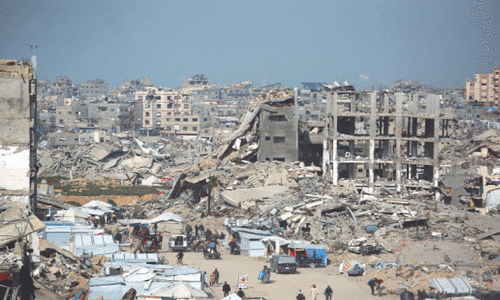THE phrase ‘Rangers-led operation’ is one that Karachi’s residents have become used to.
Indeed, any announcement about it being wrapped up would be greeted with incredulity and even some trepidation.
The visit on Thursday of army chief Gen Qamar Bajwa to the city’s corps headquarters where he was apprised of the security situation in Sindh, particularly Karachi, made it clear that in the view of the security establishment this is an open-ended operation that would “continue to maintain normalcy” in the city.
There has certainly been a precipitous decline in major crimes, including targeted killings, terrorist attacks, extortion and kidnapping in the metropolis since the campaign began in September 2013.
The preceding years had seen Karachiites become hostage to a host of lawless elements, including militant wings of political parties and violent extremists; the near-cessation in their activities thus elicited much relief.
However, street crime remains the Achilles’ heel of the much-vaunted operation, and until the law-enforcement authorities manage to bring it under control, residents of the city will continue to feel vulnerable every time they step out of their homes.
That is not the definition of a truly successful law-and-order operation.
With around 105 police stations in Karachi, the police, unlike the Rangers, have a grass-roots presence in Pakistan’s biggest urban centre which gives them an important advantage over a paramilitary force institutionally at a remove from the public.
This advantage, however, means little when recruitment and promotions in the police have for years been based on political considerations rather than merit, and when hundreds of personnel, even those belonging to the elite force, are on protocol duty for VVIPs.
Moreover, for a long-term, sustainable solution to Karachi’s law-and-order problems, it is imperative to strengthen the police, weed out the politicisation that has corrupted it; increase its funding; and bring in criminal justice reforms that will supplement its work.
Fortunately, there seems to be some realisation of how deep the rot had gone, or at least events have so transpired that the Sindh government has been unable to interfere in the workings of the police to the same extent.
Recruitments are said to have taken place on merit for the first time through credible tests.
Nevertheless, a spate of incidents in recent months, including the killing of Naqeebullah Mehsud and Intezar Ahmed, shows that much has to change if the police are to serve the public.
Published in Dawn, March 3rd, 2018













































